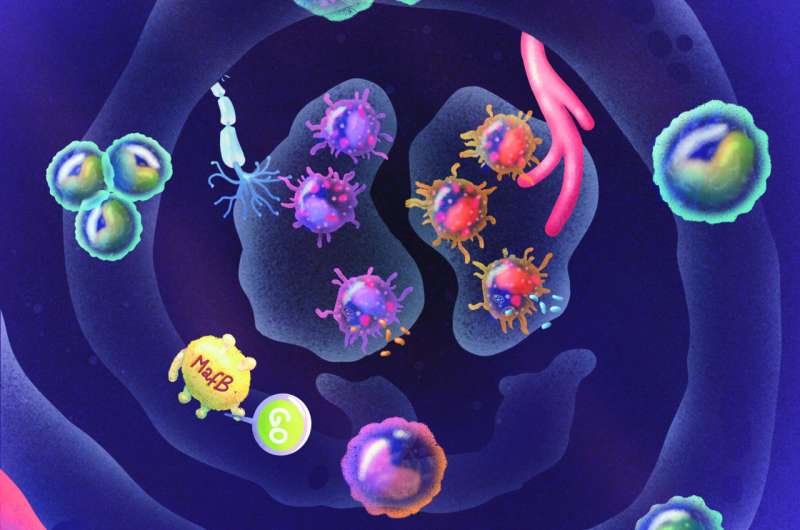This article has been reviewed according to Science X's editorial process and policies. Editors have highlighted the following attributes while ensuring the content's credibility:
fact-checked
peer-reviewed publication
trusted source
proofread
Discovery of an unexpected function of blood immune cells: Their ability to proliferate

The ability of a cell to divide, to proliferate, is essential for life and gives rise to the formation of complex organisms from a single cell. It also allows the replacement of used cells from a limited number of "stem" cells, which then proliferate and specialize. In cancer, however, cell proliferation is no longer controlled and becomes chaotic.
Researchers from the GIGA Institute at the University of Liège have discovered that, in a healthy individual, certain blood immune cells, the monocytes, also have this ability to proliferate, with the aim to replace tissue macrophages, which are essential for the proper functioning of our body. This study is published in Nature Immunology.
The formation of complex multicellular organisms, which human beings belong to, requires the generation of billions of cells from a limited number of progenitor cells that have first proliferated and then acquire particular morphologies and functions while assembling into tissues and organs. Our current knowledge indicates that most of the cells that constitute a living organism arise from so-called "stem" cells, which have divided by a process called mitosis in order to give rise to a greater number of cells.
These cells then stop proliferating to specialize, differentiate and form muscles, brain, bones, immune cells, etc. When proliferation is no longer properly regulated, this can lead to the development of various diseases, among which cancers represent the most striking example.
In a study published in Nature Immunology, Professor Thomas Marichal (Professor at ULiège, Welbio investigator at the WEL Research Institute) and his team from the GIGA Institute at ULiège discovered that this ability to proliferate is not merely restricted to stem cells, but is also an as-yet-unknown function of blood immune cells, the monocytes.
Indeed, blood monocytes, previously considered as differentiated cells, are capable of proliferating and generating a pool of monocytes in the tissues in order to give rise to macrophages, which are important immune cells that protect us against microbes and support the proper functioning of our organs.
"This is a major fundamental discovery, which changes our conception of the involvement of cell proliferation in the constitution and maintenance of our immune system," explains Thomas Marichal, director of the study. "Our finding also suggests that the information that can be drawn from an enumeration of blood monocytes, classically carried out during a blood test, would reflect only little of what is happening at the level of the tissues, during 'infection or inflammation, for example, since monocytes can proliferate when they enter tissues."
He also adds, "Fortunately, this proliferation is extremely well controlled and does not lead to a tumoral process. It has only one goal: to allow, as effectively as possible, the replacement of immune cells that populate our tissues: the macrophages."
This discovery was possible thanks to the development of new tools and the use of innovative technologies. "This study is a great example of how technological advances can drive breakthrough scientific discoveries. It would have been extremely difficult, if not impossible, to study with such a resolution this population of proliferating monocytes only 10 years ago. This required the use of state-of-the-art equipment recently acquired at the GIGA Institute, the generation of complex genomic data and very sophisticated bioinformatics analyses," explains Domien Vanneste, first author of the study.
This study paves the way for future investigations that will evaluate the possibility of manipulating or controlling monocyte proliferation for therapeutic purposes, at the benefit of an enhanced health.
More information: Domien Vanneste et al, MafB-restricted local monocyte proliferation precedes lung interstitial macrophage differentiation, Nature Immunology (2023). DOI: 10.1038/s41590-023-01468-3





















